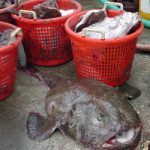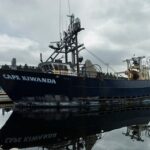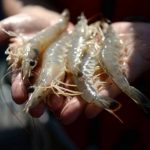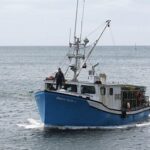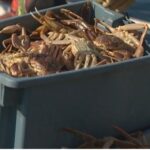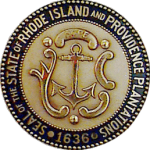Search Results for: CETA
Scottish Government Discusses Cetacean Deaths from Fishing Line Entanglements
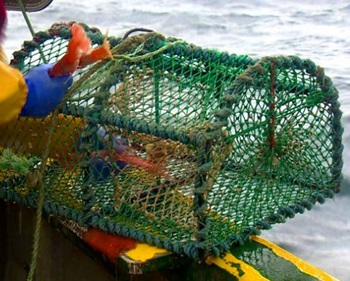 The Scottish Government has engaged in discussions with the Scottish Association for Marine Science (SAMS) regarding their research into reducing cetacean deaths caused by fishing line entanglements. This issue was highlighted during a parliamentary session, where Kenneth Gibson (SNP) inquired about the government’s actions on the matter. Cabinet Secretary for Rural Affairs, Land Reform, and Islands, Mairi Gougeon, acknowledged the importance of the research and the government’s commitment to addressing the issue. She emphasized the government’s intention to work with stakeholders to minimize bycatch and entanglement of sensitive marine species through the future catching policy. This effort aligns with Scotland’s broader goal of ensuring sustainable fisheries. more, >>CLICK TO READ<< 08:56
The Scottish Government has engaged in discussions with the Scottish Association for Marine Science (SAMS) regarding their research into reducing cetacean deaths caused by fishing line entanglements. This issue was highlighted during a parliamentary session, where Kenneth Gibson (SNP) inquired about the government’s actions on the matter. Cabinet Secretary for Rural Affairs, Land Reform, and Islands, Mairi Gougeon, acknowledged the importance of the research and the government’s commitment to addressing the issue. She emphasized the government’s intention to work with stakeholders to minimize bycatch and entanglement of sensitive marine species through the future catching policy. This effort aligns with Scotland’s broader goal of ensuring sustainable fisheries. more, >>CLICK TO READ<< 08:56
Newly released data reveals record number of cetacean deaths in UK waters
 Tragically, more than 1000 whales, dolphins and porpoises were stranded around the UK in 2018 – and it was a similar number the following year with 980 cetaceans reported to the Cetacean Strandings Investigation Programme (CSIP) in 2019. What is causing the huge upturn in cetacean deaths around the UK? There could be a number of factors of course, there are many theories out there, but at least in the case of the Sperm whales in Yorkshire, we can largely rule out ship strike and entanglement, often casually blamed for the deaths of marine mammals. Whatever your hypothesis, whether you choose to blame climate change, naval sonar, fishing, pollution or plastics, don’t ignore the elephant in the room – industrial offshore wind farms. more, >>CLICK TO READ<< 07:37
Tragically, more than 1000 whales, dolphins and porpoises were stranded around the UK in 2018 – and it was a similar number the following year with 980 cetaceans reported to the Cetacean Strandings Investigation Programme (CSIP) in 2019. What is causing the huge upturn in cetacean deaths around the UK? There could be a number of factors of course, there are many theories out there, but at least in the case of the Sperm whales in Yorkshire, we can largely rule out ship strike and entanglement, often casually blamed for the deaths of marine mammals. Whatever your hypothesis, whether you choose to blame climate change, naval sonar, fishing, pollution or plastics, don’t ignore the elephant in the room – industrial offshore wind farms. more, >>CLICK TO READ<< 07:37
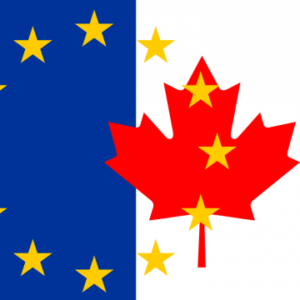
USITC to launch lobster investigation – “Lobsters: Effects of the CETA Agreement on the U.S. Industry”
The U.S. International Trade Commission (USITC) on Monday announced an investigation into possible negative effects of the Canada-European Union Comprehensive Economic and Trade Agreement (CETA) on the U.S. lobster industry and the volume of U.S. exports of lobster. The investigation, “Lobsters: Effects of the Canada-EU Trade Agreement on the U.S. Industry,” was requested by U.S. Trade Representative Robert Lighthizer in a letter on July 29. The USITC, an independent, nonpartisan, factfinding federal agency, said it will: Provide an overview of the U.S. and Canadian lobster industries,,, >click to read< 10:33
Search Results for CETA going back to 2012 – >click here<

Two years after CETA took effect, fisheries minister says Tory exemptions devalued the industry
In 2013, negotiations between Canada and the European Union over the Comprehensive Economic and Trade Agreement, or CETA, included talks on how Newfoundland and Labrador might be compensated for losses once the deal was implemented. The provincial PC government of the time insisted on a $400-million compensation program, noted Byrne. “I can certainly understand why they’d take that position,” Byrne said. But that fund never materialized, >click to read<10:56
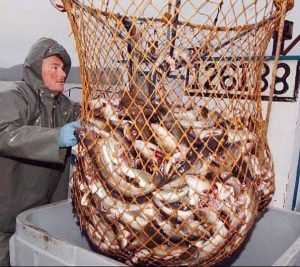
CETA and Atlantic Canada’s fishery: From international trade to the outport stage
As trade grows between Canada and the European Union (EU), the results of this international partnership are washing ashore in fishing outports across the province. The fishery, which was historically the economic foundation of Newfoundland and Labrador, is today an industry continuously beset by cuts, declines and uncertainties. But in recent years, words of hope and rebound are growing in the public discourse. With tariffs declining and opportunities arising, the Comprehensive Economic and Trade Agreement (CETA) between Canada and the EU has the potential to play a key role in the livelihoods of harvesters and processors. >click to read<11:12
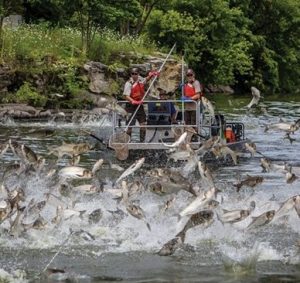
Pricetag of Asian Carp Defense Project Climbs to $778 Million
The forecasted pricetag of a planned Asian carp defense system near Joliet, Illinois that would hopefully prevent the invasive species from infiltrating the Great Lakes has now climbed to $778 million, up from an initial estimate of $275 million, according to an update last week from the U.S. Army Corps of Engineers. As reported by the Detroit News, the project, which would be finished sometime between 2025 and 2027, will now be reviewed by state and federal agencies. If Congress funds the initiative, an electric barrier would be installed as well as underground speakers to essentially blast noise at fish to stop them in their tracks northbound. >click to read<12:12

CETA: U.S. lobster industry alarmed as European deal gives Canadians a ‘huge’ advantage
Canada may be getting beaten up at the NAFTA talks in Washington, but off the east coast, it is enjoying something of a free-trade coup. This country’s trade accord with Europe has given the Canadian lobster industry a sudden leg-up on American competitors in the lucrative market, adding to alarm in the U.S. lobster world over retaliatory tariffs from China. As European duties start to come off the crustaceans, Canada is gaining a price edge ranging from six to 20 per cent over shellfish from the United States, prompting the American industry and a prominent member of Congress to press the U.S. government for help. >click to read<
Newfoundland and Labrador – What did we get for giving up MPRs under CETA?
 The Canada-European Union Comprehensive Economic and Trade Agreement (CETA) is the trade deal Canada just signed with the European Union, and the signature for Canada was Justin Trudeau. Minimum processing requirements (MPRs) reflect an established right of a province to impose minimum processing requirements for fish landed at our ports. In the past, exemptions have been approved for the export of unprocessed fish when the market required it and/or when processing was not viable. No other province in Atlantic Canada had used MPRs for fish over the past number of years, except Newfoundland and Labrador. click here to read the op-ed by Keith Hutchings10:10
The Canada-European Union Comprehensive Economic and Trade Agreement (CETA) is the trade deal Canada just signed with the European Union, and the signature for Canada was Justin Trudeau. Minimum processing requirements (MPRs) reflect an established right of a province to impose minimum processing requirements for fish landed at our ports. In the past, exemptions have been approved for the export of unprocessed fish when the market required it and/or when processing was not viable. No other province in Atlantic Canada had used MPRs for fish over the past number of years, except Newfoundland and Labrador. click here to read the op-ed by Keith Hutchings10:10
CETA: Canada-European Union pact worries US lobster industry
 Members of the U.S. seafood industry are fearful that Canada’s approval of a new trade deal with the European Union will cause big problems for the American lobster business, just as the catch is hitting historic highs. The Canada-European Union Comprehensive Economic and Trade Agreement Implementation Act, or CETA, cleared its final hurdle in the Parliament of Canada on Tuesday. The deal gets rid of tariffs on Canadian lobster exports to the 28-nation bloc, putting Canada at a huge advantage over the U.S. click here to read the story 11:06
Members of the U.S. seafood industry are fearful that Canada’s approval of a new trade deal with the European Union will cause big problems for the American lobster business, just as the catch is hitting historic highs. The Canada-European Union Comprehensive Economic and Trade Agreement Implementation Act, or CETA, cleared its final hurdle in the Parliament of Canada on Tuesday. The deal gets rid of tariffs on Canadian lobster exports to the 28-nation bloc, putting Canada at a huge advantage over the U.S. click here to read the story 11:06
CETA – Canada-European Union pact worries US lobster industry
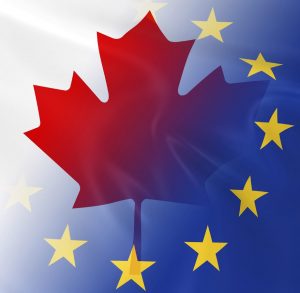 Members of the U.S. seafood industry are fearful that Canada’s approval of a new trade deal with the European Union will cause big problems for the American lobster business, just as the catch is hitting historic highs. The Canada-European Union Comprehensive Economic and Trade Agreement Implementation Act, or CETA, cleared its final hurdle in the Parliament of Canada on Tuesday. The deal gets rid of tariffs on Canadian lobster exports to the 28-nation bloc, putting Canada at a huge advantage over the U.S.,,, Seafood exporters and lobster industry members like Dave Madden, owner of exporter Lobster Trap in Bourne, Massachusetts, said they fear loss of money and jobs in the U.S. under the new rules. He ships about 4.5 million pounds of lobsters to countries such as Italy, France and Spain per year. click here to read the story 19:27
Members of the U.S. seafood industry are fearful that Canada’s approval of a new trade deal with the European Union will cause big problems for the American lobster business, just as the catch is hitting historic highs. The Canada-European Union Comprehensive Economic and Trade Agreement Implementation Act, or CETA, cleared its final hurdle in the Parliament of Canada on Tuesday. The deal gets rid of tariffs on Canadian lobster exports to the 28-nation bloc, putting Canada at a huge advantage over the U.S.,,, Seafood exporters and lobster industry members like Dave Madden, owner of exporter Lobster Trap in Bourne, Massachusetts, said they fear loss of money and jobs in the U.S. under the new rules. He ships about 4.5 million pounds of lobsters to countries such as Italy, France and Spain per year. click here to read the story 19:27
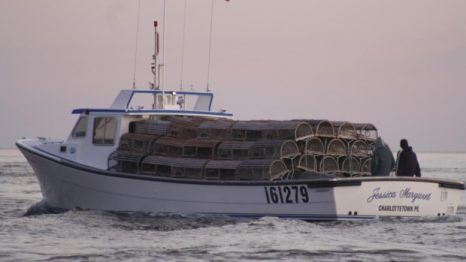
CETA Deal could be in force for opening day of lobster season on P.E.I.
Canada’s free trade deal with Europe is only steps away from being ratified in Ottawa, and the Lobster Council of Canada is telling exporters to get ready. When CETA is passed an eight per cent tariffs on live lobster shipped to Europe will immediately disappear, and could happen as soon as May 1, the day the spring lobster season on P.E.I. opens. Lobster industry officials in Maine are worried that the disappearance of those tariffs, while tariffs on U.S. lobster remain, could eat into their exports. “For the lobster sector it will mean tariff free access to 27 countries in Europe over the next number of years,” said Geoff Irvine, executive director of the Lobster Council of Canada. Read the rest here 12:32
CETA: Liberals’ passivity a detriment to our fishery
 The Comprehensive Economic Trade Agreement (CETA) was approved with Premier Dwight Ball and Prime Minister Justin Trudeau in office. So, what was negotiated to transition our fishing industry to a more competitive, technologically advanced, scientific and market-driven industry? Apparently, according to Premier Ball, nothing! An area of provincial jurisdiction was relinquished to Ottawa to use in their negotiations with the EU, with only silence from the Ball Liberals for the past 15 months, despite a signed letter from Trudeau promising that this province would be given a $400-million fisheries investment fund as a condition of giving up minimum processing requirements (MPRs). There was no mention of an “Atlantic” fisheries fund in his letter.In 2014, Trudeau wrote: “your government’s support of the CETA was earned, in part, by a promise from the Government of Canada to help the industry adjust to the new reality. That promise should be honoured.” He referred specifically to the $400-million fund for Newfoundland and Labrador. Premier Ball was not able to deliver on that written commitment. continue reading the op-ed here 10:18
The Comprehensive Economic Trade Agreement (CETA) was approved with Premier Dwight Ball and Prime Minister Justin Trudeau in office. So, what was negotiated to transition our fishing industry to a more competitive, technologically advanced, scientific and market-driven industry? Apparently, according to Premier Ball, nothing! An area of provincial jurisdiction was relinquished to Ottawa to use in their negotiations with the EU, with only silence from the Ball Liberals for the past 15 months, despite a signed letter from Trudeau promising that this province would be given a $400-million fisheries investment fund as a condition of giving up minimum processing requirements (MPRs). There was no mention of an “Atlantic” fisheries fund in his letter.In 2014, Trudeau wrote: “your government’s support of the CETA was earned, in part, by a promise from the Government of Canada to help the industry adjust to the new reality. That promise should be honoured.” He referred specifically to the $400-million fund for Newfoundland and Labrador. Premier Ball was not able to deliver on that written commitment. continue reading the op-ed here 10:18
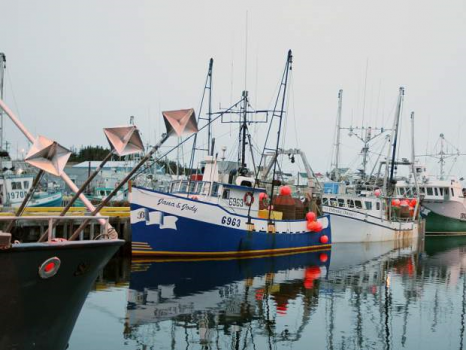
Fund compensating Newfoundland seafood industry could resolve one of the final obstacles to CETA deal
With the United States poised to adopt a more protectionist trade policy under President-Elect Donald Trump, some good news for supporters of Canada’s major trade deal with the European Union could come this week. A decision is expected soon on compensation for businesses in Newfoundland and Labrador that would lose out due to provisions in the recently-signed Comprehensive Economic and Trade Agreement (CETA) — one of the last potential causes of a hold-up on the Canadian side of the deal. A Liberal source said Prime Minister Justin Trudeau has been discussing a special fisheries fund with Premier Dwight Ball and an announcement could come as soon as later this week. Read the rest here 19:31
Why trade deals like CETA have become a ‘whipping boy’ for anti-globalization forces
 Globalization has always had its critics — there’s nothing new there, says Fen Hampson, professor of international affairs at Carleton University’s Norman Paterson School of International Affairs. But given the problems Europe is experiencing now, with high levels of unemployment, particularly among youth, it’s not surprising that free trade deals like the Canada-EU CETA have become “a whipping boy for very unhappy people who are out of work,” Hampson said. And that’s why the backlash against the Comprehensive Economic and Trade Agreement, he said, is symptomatic of growing anti-globalization sentiments, and may well have played a role in the decision by Belgium’s Wallonia socialist government to scuttle the trade pact between Canada and the 28-nation bloc. Read the rest here 11:33
Globalization has always had its critics — there’s nothing new there, says Fen Hampson, professor of international affairs at Carleton University’s Norman Paterson School of International Affairs. But given the problems Europe is experiencing now, with high levels of unemployment, particularly among youth, it’s not surprising that free trade deals like the Canada-EU CETA have become “a whipping boy for very unhappy people who are out of work,” Hampson said. And that’s why the backlash against the Comprehensive Economic and Trade Agreement, he said, is symptomatic of growing anti-globalization sentiments, and may well have played a role in the decision by Belgium’s Wallonia socialist government to scuttle the trade pact between Canada and the 28-nation bloc. Read the rest here 11:33

CETA is OVER: Belgian PM kills trade deal in devastating blow to EU
Charles Michel said after a meeting with regional leaders: “I have officially told Tusk that we have no agreement.” The EU had given Belgium until Monday to overcome opposition to the CETA trade deal from its French-speaking south before it would likely have to cancel a Thursday summit with Canadian Prime Minister Justin Trudeau to sign the pact. Mr Michel said he was still open to dialogue with the main holdout, the region of Wallonia, and that it was too early to say whether CETA was dead.EU and Canadian leaders have said they are keen to conclude the deal after years of negotiation. Mr Michel could not provide the consent of Belgium to that of the other 27 EU member states without backing from five regional authorities. Read the rest here 11:11
CETA on life support because of Brexit
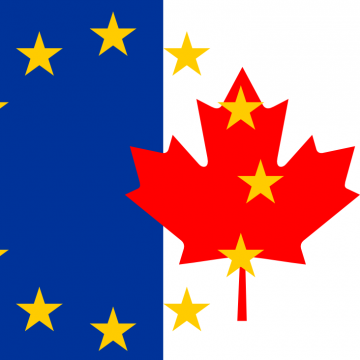 The Brexit vote has left Europe in a mess – and dealt a serious blow to Canada’s trade prospects. (CETA, Canadian fishery issues, click here) The British pound is dropping, world markets are scrambling and most are wondering how the political establishment will address what appears to be a constitutional vacuum related to exiting member-states of the European Union. It speaks to how ill-prepared the union was to such an eventuality. Yet the biggest casualty of Brexit will likely be global trading. And Canada may pay a huge price, since our Comprehensive Economic and Trade Agreement (CETA) with the EU is still under negotiation and won’t be ratified any time soon. And with so much uncertainty in agricultural policies particularly, CETA is undoubtedly on life support, at best. CETA emphasizes Canada’s relationship with the EU and was Canada’s greatest chance to become a significant portal between both continents. The United Kingdom is one of our top food trading partners within the EU and there was great potential to further increase trade in certain commodities. Read the rest here 13:55
The Brexit vote has left Europe in a mess – and dealt a serious blow to Canada’s trade prospects. (CETA, Canadian fishery issues, click here) The British pound is dropping, world markets are scrambling and most are wondering how the political establishment will address what appears to be a constitutional vacuum related to exiting member-states of the European Union. It speaks to how ill-prepared the union was to such an eventuality. Yet the biggest casualty of Brexit will likely be global trading. And Canada may pay a huge price, since our Comprehensive Economic and Trade Agreement (CETA) with the EU is still under negotiation and won’t be ratified any time soon. And with so much uncertainty in agricultural policies particularly, CETA is undoubtedly on life support, at best. CETA emphasizes Canada’s relationship with the EU and was Canada’s greatest chance to become a significant portal between both continents. The United Kingdom is one of our top food trading partners within the EU and there was great potential to further increase trade in certain commodities. Read the rest here 13:55
CETA breakthrough revives discussion over contentious fisheries renewal fund
 Newfoundland and Labrador’s representative in the federal cabinet says talks are underway about how the province might be compensated for losses incurred once a Canada-European Union trade deal is implemented. Public Services and Procurement Minister Judy Foote was in St. John’s Monday to speak to a business audience, but fisheries issues garnered most of the attention when she met later with reporters. The federal government announced Monday that a legal review of the English text of the Canada-European Union Comprehensive Economic and Trade Agreement (CETA) is now complete. Read the rest here 08:43
Newfoundland and Labrador’s representative in the federal cabinet says talks are underway about how the province might be compensated for losses incurred once a Canada-European Union trade deal is implemented. Public Services and Procurement Minister Judy Foote was in St. John’s Monday to speak to a business audience, but fisheries issues garnered most of the attention when she met later with reporters. The federal government announced Monday that a legal review of the English text of the Canada-European Union Comprehensive Economic and Trade Agreement (CETA) is now complete. Read the rest here 08:43
Paul Davis raising questions about sale of Quin-Sea Fisheries and CETA
 Opposition Leader Paul Davis is raising questions about the pending sale of one of Newfoundland and Labrador’s largest seafood companies to a firm wholly. It was revealed last month that a company called Royal Greenland has reached an agreement to purchase Quin-Sea Fisheries Ltd. In a news release issued on New Year’s Eve, PC leader and former premier Paul Davis said he has written the licensing board, urging it to consider a number of questions, including the possibility that a foreign company may gain control of Canadian seafood quotas. Read the article here 16:35
Opposition Leader Paul Davis is raising questions about the pending sale of one of Newfoundland and Labrador’s largest seafood companies to a firm wholly. It was revealed last month that a company called Royal Greenland has reached an agreement to purchase Quin-Sea Fisheries Ltd. In a news release issued on New Year’s Eve, PC leader and former premier Paul Davis said he has written the licensing board, urging it to consider a number of questions, including the possibility that a foreign company may gain control of Canadian seafood quotas. Read the article here 16:35
NO DEAL Ottowa- Minimum Processing Requirements ‘off the table’ in CETA spat
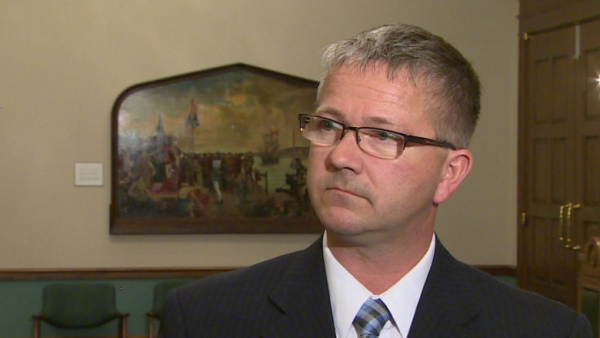 A dispute between the Newfoundland and Labrador government and Ottawa surrounding the Canadian European Union Comprehensive Trade Agreement (CETA) was reignited Tuesday, with the province saying it will not relinquish authority over minimum fish processing requirements, or MPRs. Darin King, Minister of Business, Tourism, Culture and Rural Development, said the decision is related to the federal government’s refusal to live up to an agreement reached in 2013 on the creation of a $400-million fisheries renewal fund, Read the rest here 17:40
A dispute between the Newfoundland and Labrador government and Ottawa surrounding the Canadian European Union Comprehensive Trade Agreement (CETA) was reignited Tuesday, with the province saying it will not relinquish authority over minimum fish processing requirements, or MPRs. Darin King, Minister of Business, Tourism, Culture and Rural Development, said the decision is related to the federal government’s refusal to live up to an agreement reached in 2013 on the creation of a $400-million fisheries renewal fund, Read the rest here 17:40
CETA negotiations suspended over fisheries fund, N.L. says
![]() Newfoundland and Labrador is and all trade agreements currently being negotiated with the federal government. Newfoundland and Labrador says the federal government is not honouring a prior commitment to set up the fund, which it says will be needed to help the seafood industry when a trade deal with the European Union is approved. Read the rest here 12:18
Newfoundland and Labrador is and all trade agreements currently being negotiated with the federal government. Newfoundland and Labrador says the federal government is not honouring a prior commitment to set up the fund, which it says will be needed to help the seafood industry when a trade deal with the European Union is approved. Read the rest here 12:18
“Snappy Dresser” Peter MacKay says $280M CETA fisheries fund never meant to be ‘slush fund’
Ottawa and the provincial government have been at odds over the interpretation of the $280-million fisheries fund for  , with the province claiming the federal government has put new stipulations on the deal. Read the rest here 20:25
, with the province claiming the federal government has put new stipulations on the deal. Read the rest here 20:25
BAKER – CETA: Political showdown or tempest in a teapot?
 The continuing ruckus around the is feeling a little bit like a Twilight Zone episode: What is real? What isn’t? Why did this suddenly become an issue? Who promised what? And who was the man in the red hat? All good questions. Well, mostly. Read the rest here 16:31
The continuing ruckus around the is feeling a little bit like a Twilight Zone episode: What is real? What isn’t? Why did this suddenly become an issue? Who promised what? And who was the man in the red hat? All good questions. Well, mostly. Read the rest here 16:31
Lobstermen victims of circumstance! Whale watcher boat Cetacea? Lobster rope? How about a big assed piece of cable!
 Initial attempts by the divers to clear the line from the propeller were unsuccessful. Original reports indicated a lobster pot line was caught in the propeller, but further analysis revealed it was a cable from Northeast Gateway’s offshore facility which required additional dive resources and heavy duty equipment for removal. Read more here 18:56
Initial attempts by the divers to clear the line from the propeller were unsuccessful. Original reports indicated a lobster pot line was caught in the propeller, but further analysis revealed it was a cable from Northeast Gateway’s offshore facility which required additional dive resources and heavy duty equipment for removal. Read more here 18:56
CETA Relevance to NL Inshore/Coastal Communities – Winston Fiander
![]() Newfoundland and Labrador are blessed with some 40,000 kilometers of coastline which has hundreds of communities situated adjacent to some of the richest fishing grounds in the world. Read more@sustainablefisheriesca 11:08
Newfoundland and Labrador are blessed with some 40,000 kilometers of coastline which has hundreds of communities situated adjacent to some of the richest fishing grounds in the world. Read more@sustainablefisheriesca 11:08
Canada: What’s missing from CETA deal? Some folks in the province’s sealing industry can probably give you an idea.
 We’ve talked a lot about the things that were included in the CETA deal, but what might be missing from it? Some folks in the province’s sealing industry can probably give you an idea. listen @thefisheriesbroadcast 17:52
We’ve talked a lot about the things that were included in the CETA deal, but what might be missing from it? Some folks in the province’s sealing industry can probably give you an idea. listen @thefisheriesbroadcast 17:52
Why the Snub? CETA tour takes feds to all provinces, except N.L.
![]() The absence of this province from the cross country tour comes after a similar absence during a major press conference on Oct. 29 announcing a $400 million federal-provincial fisheries fund. The federal government is contributing $280 million to that fund, but not a single federal MP, senator or bureaucrat attended the event held at the Rooms in St. John’s. more@cbcnews 20:51
The absence of this province from the cross country tour comes after a similar absence during a major press conference on Oct. 29 announcing a $400 million federal-provincial fisheries fund. The federal government is contributing $280 million to that fund, but not a single federal MP, senator or bureaucrat attended the event held at the Rooms in St. John’s. more@cbcnews 20:51
Brussels-based (CETA) memo contradicts Canadian statements – says N.L. fish will help European processors
![]() “I have to talk to both Canadian and European trade people (about this),” Simms told The Fisheries Broadcast, adding that his next question is, “To what extent do processors in the European Union want the raw material from the Newfoundland and Labrador coast to feed their plants?” THEY WANT IT ALL!! more@cbcnews 14:31
“I have to talk to both Canadian and European trade people (about this),” Simms told The Fisheries Broadcast, adding that his next question is, “To what extent do processors in the European Union want the raw material from the Newfoundland and Labrador coast to feed their plants?” THEY WANT IT ALL!! more@cbcnews 14:31
The discussion on CETA and the $400 million fisheries fund is hitting on a recurring question: is there enough information out there about the proposed plans? We’ll look at how the debate is shaping up politically, from the viewpoint of three very different participants. Listen, thefisherybroadcast
Free trade deal could open ports to rogue fishing vessels – CETA may grant EU vessels ‘most-favoured’ status for Canadian port access
 There are concerns that CETA, the proposed free trade agreement between Canada and Europe, could make it more difficult for Canada to restrict access to its ports for European vessels, including those cited for fishing infractions outside the 200-mile limit, CBC News has learned. more@cbcnews 07:46
There are concerns that CETA, the proposed free trade agreement between Canada and Europe, could make it more difficult for Canada to restrict access to its ports for European vessels, including those cited for fishing infractions outside the 200-mile limit, CBC News has learned. more@cbcnews 07:46
Baker | Lack of detail on fish announcements – In some ways, CETA complexities may muddy the waters some more
![]()
![]() It’s been a wild couple of weeks, to the degree that it’s almost impossible to get one’s head around all that’s been announced and said. But it’s safe to say at this point there is not hardly enough detail available to make any kind of final assertion about whether or not it will add up to a better fishing industry for everyone involved. more@cbcnews 21:36
It’s been a wild couple of weeks, to the degree that it’s almost impossible to get one’s head around all that’s been announced and said. But it’s safe to say at this point there is not hardly enough detail available to make any kind of final assertion about whether or not it will add up to a better fishing industry for everyone involved. more@cbcnews 21:36
Earle McCurdy, president of the Fish, Food and Allied Workers: CETA good for fishery. Is it?
 McCurdy says minimum processing requirements will be phased out as a result of CETA. These are rules that require some species of fish caught here be processed before export. Processors who want to ship seafood out of province unprocessed will be able to apply for an exemption, according to McCurdy, something he’s not worried about. more@thepacketca 13:32
McCurdy says minimum processing requirements will be phased out as a result of CETA. These are rules that require some species of fish caught here be processed before export. Processors who want to ship seafood out of province unprocessed will be able to apply for an exemption, according to McCurdy, something he’s not worried about. more@thepacketca 13:32
Details remain elusive on massive EU deal as Ottawa keeps most material under wraps – The deal has obvious benefits with a trading partner with which we have deep historic ties and mutual interests. It also lessens our dependency on the United States, and based on that country’s recent flirtations with economic disasters, it’s a good thing we are broadening our trading partnerships. link

































